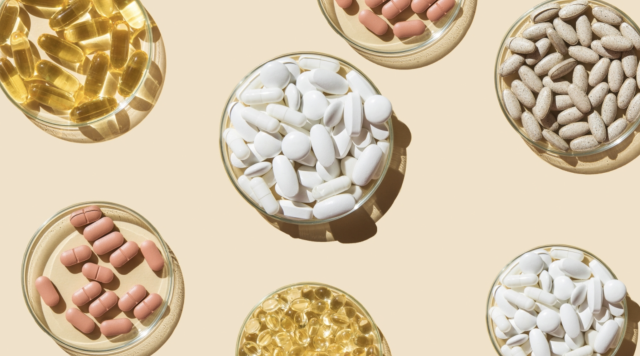More than 15 million Americans abuse these multivitamins, which are liver toxic!
A new study from the University of Michigan estimates that 15.6 million American adults regularly take medications and dietary supplements that can be toxic to their liver.
The six supplements are turmeric, green tea, Nightshade, black cohosh, garcinia cambogia and red yeast rice.
Popular science knowledge
According to medical experts, these six supplements each have their own unique benefits and applications:
Turmeric (Curcuma longa) : The active ingredient in turmeric is curcumin, which has anti-inflammatory, antioxidant properties and is often used to relieve arthritis, support liver health, and help improve digestion.
Green tea (Camellia sinensis) : Green tea is rich in antioxidants, especially catechins, which help with weight loss, boost immunity, promote cardiovascular health, and may reduce the risk of certain cancers.
Withania somnifera: Also known as Indian ginseng or Ayurvedic herb, South African Somnifera has adaptogenic properties that help the body cope with stress, support nervous system health, and enhance physical strength and immune function.
Black cohosh (Cimicifuga racemosa) : Commonly used in women’s health, especially to relieve menopausal symptoms such as hot flashes and mood swings. Black cohosh may also support bone health.
Garcinia cambogia: Garcinia cambogia contains an active ingredient hydroxycitric acid (HCA) that is commonly used in weight loss supplements designed to suppress appetite and block fat synthesis.
Red yeast rice (Monascus purpureus) : Red yeast rice is produced from naturally fermented rice and contains a statin like ingredient, Monacolin K, which is often used to lower cholesterol levels and support cardiovascular health.
Millions of people worldwide take supplements every day to improve their overall health, boost their immunity and treat minor illnesses. Last year, supplement sales in the United States exceeded $150 billion.
More than 80,000 of these substances, such as multivitamins, minerals and vitamin D, omega-3 fatty acids and calcium products, are available in retail stores or on the Internet.
Medical experts say we had no idea so many people were taking these supplements. These supplements appear to be most popular among older, educated white women looking for relief from arthritis, fatigue, and menopause symptoms.
Fatal culprit
The study looked at supplement intake in nearly 9,700 adults over a 30-day period between 2017 and 2020.
Among those surveyed, turmeric was the most popular (3.46%), followed by green tea (1.01%), South African eggplant and black cohosh (0.38%), garcinia cambogiae (0.27%) and red yeast rice products (0.19%).
Seventy percent of garcinia cambogia users said they took the supplement to lose weight, while 90 percent of those who took red yeast rice did so to improve their heart health.
But there’s another little-known side to these supplements: green tea, Nightshade, black cohosh, garcinia cambogia and red yeast rice can all be toxic to the liver.
The researchers note that liver damage caused by hepatotoxicity, or drugs, is on the rise, with the latest data showing that supplements account for 20 percent of such cases. Twenty years ago, they accounted for only 7%.
The study’s authors also said that the most common plant products in these cases, including South African eggplant, green tea extract and garcinia cambogia, were responsible for “potentially serious and even fatal liver damage.”
The new study does not specify the dosage or frequency of use that may cause liver damage.
Lack of supervision
The paper notes that more than 80,000 unique multivitamin products are available worldwide, and U.S. supplement sales will exceed $150 billion in 2023, a figure comparable to the total sales of prescription drugs.
Another study found that the number of liver transplants due to injuries caused by supplements increased by 70 percent between 2010 and 2020, compared with 1994 to 2009.
Lack of FDA certification and government regulation, as well as chronic mislabeling, are at the root of the overuse and even abuse of supplements. The study found that most older adults do not need to take fish oil supplements to prevent dementia.
Most supplements have clearly stated ingredients on their labels. However, an estimated 5 to 12 percent of supplements are plant-derived, complex, multi-ingredient botanicals. And chemical analysis triggered by liver toxicity shows that there are often discrepancies between product labels and detected ingredients.
“In previous studies, we’ve found a lot of mislabeling in some of these products,” Dr. Robert Fontana, a hepatologist at the University of Michigan Medical School, professor of medicine and senior author of the study, explained, “We conducted a chemical analysis and found that the ingredients on the labels of many products not authorized by the FDA did not match the actual ingredients by about 50 percent, which is very concerning.”
Frequent mislabeling, coupled with a lack of government oversight and inadequate medical investigation of supplement use, has made these products a cause for great concern. “Hopefully doctors will be able to ask patients if they are taking supplements and consider the effects.” We’re not trying to create panic by saying that, “Dr. Fontana said. “We just want to raise awareness that there are huge safety concerns about over-the-counter supplements that people are taking and buying that have not been tested and may not have been proven to be safe.”

